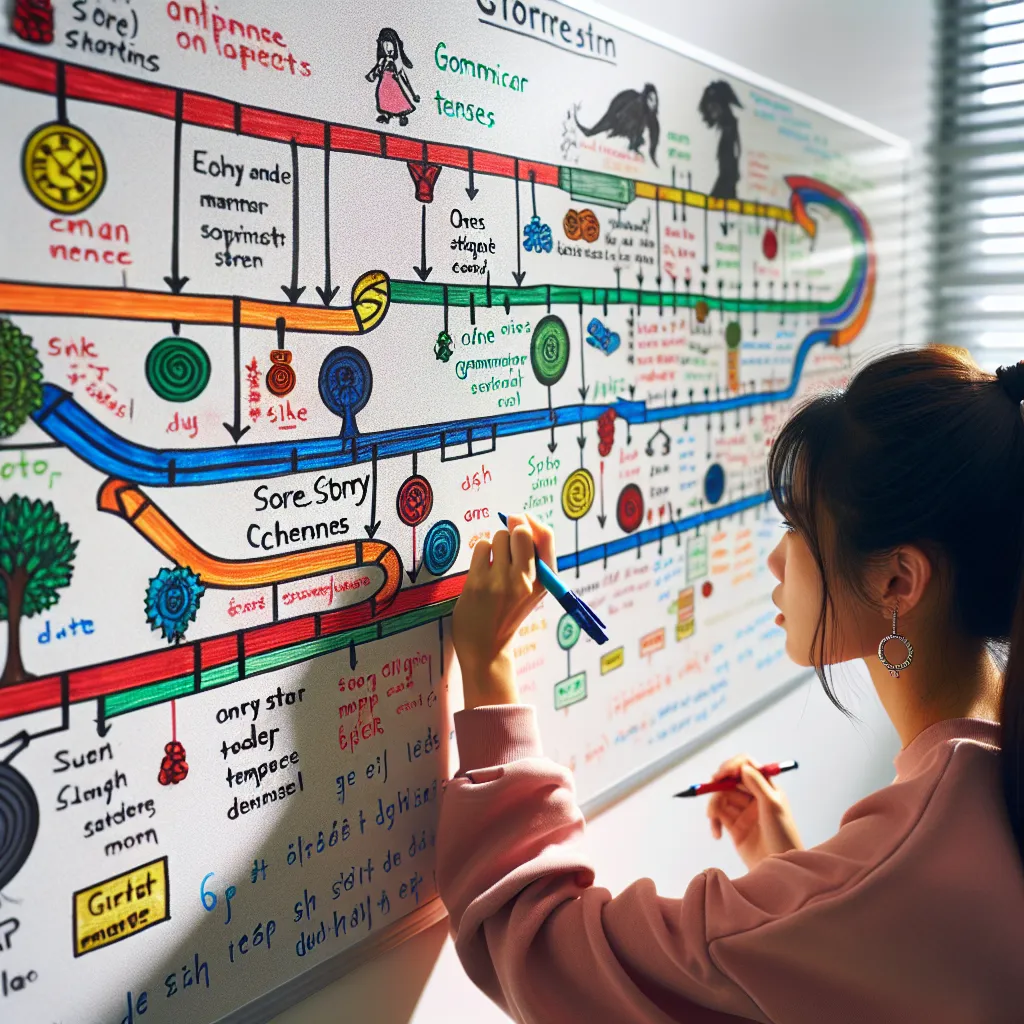Are you struggling to weave complex tenses into your storytelling? Mastering advanced tenses is crucial for creating engaging narratives that captivate your readers. This guide will walk you through the intricacies of using sophisticated tense structures to elevate your writing and bring your stories to life.
Understanding the Importance of Advanced Tenses in Narratives
Advanced tenses allow writers to manipulate time and perspective, creating depth and complexity in their storytelling. By skillfully employing these tenses, you can transport your readers through different time periods, highlight the sequence of events, and emphasize the relationships between various actions in your narrative.
 Advanced tenses in storytelling
Advanced tenses in storytelling
The Role of Tenses in Creating Narrative Depth
Tenses are not just grammatical constructs; they are powerful tools that shape the reader’s perception of your story. Advanced tenses allow you to:
- Create a sense of time and chronology
- Establish cause and effect relationships
- Add nuance and complexity to character actions and thoughts
- Build suspense and anticipation
For example, consider the difference between “He went to the store” and “He had been going to the store when he suddenly realized he forgot his wallet.” The second sentence, using the past perfect continuous tense, provides a richer context and sets the stage for further narrative development.
Key Advanced Tenses for Narrative Writing
To master advanced tenses in narratives, focus on these crucial structures:
1. Past Perfect
Use the past perfect to describe actions that occurred before the main events of your story.
Example: “By the time Sarah arrived at the party, John had already left.”
2. Past Perfect Continuous
Employ this tense to emphasize the duration of a past action that continued up to another point in the past.
Example: “He had been working on the project for months when his computer crashed.”
3. Future Perfect
Utilize the future perfect to describe actions that will be completed by a specific point in the future.
Example: “By next summer, they will have finished building their dream home.”
4. Future Perfect Continuous
Use this tense to emphasize the ongoing nature of a future action up to a specific point.
Example: “By the time we reach our destination, we will have been driving for 12 hours straight.”
Strategies for Mastering Advanced Tenses
To effectively incorporate these tenses into your narratives, try the following approaches:
-
Read extensively: Expose yourself to well-written narratives that employ advanced tenses. Analyze how authors use them to enhance their storytelling.
-
Practice with writing prompts: Create short stories or scenarios that require the use of specific advanced tenses.
-
Edit and revise: After writing, go through your work and look for opportunities to replace simple tenses with more nuanced, advanced ones where appropriate.
-
Seek feedback: Share your writing with peers or join writing groups to get constructive criticism on your use of tenses.
-
Use timeline exercises: Create visual timelines for your stories to help you understand and plan the sequence of events, making it easier to choose the right tenses.
 Timeline exercise for tense mastery
Timeline exercise for tense mastery
Common Pitfalls and How to Avoid Them
When working with advanced tenses, be aware of these common mistakes:
-
Tense shifting: Unintentionally switching between tenses can confuse readers. Maintain consistency unless there’s a clear reason for a shift.
-
Overuse: While advanced tenses add depth, overusing them can make your writing feel convoluted. Strike a balance with simpler tenses.
-
Incorrect formation: Pay attention to the correct structure of each tense, especially with irregular verbs.
-
Context misalignment: Ensure that the tense you choose aligns with the context and timeline of your narrative.
To avoid these pitfalls, regularly review your work and consider creating a tense map for complex narratives to keep track of your tense usage throughout the story.
Practical Exercises to Enhance Your Tense Mastery
To reinforce your understanding and application of advanced tenses in narratives, try these exercises:
-
Tense transformation: Take a simple paragraph and rewrite it using different advanced tenses to see how it changes the narrative’s tone and perspective.
-
Narrative gap-filling: Create a story with intentional gaps in the timeline, then use advanced tenses to fill in these gaps and create a cohesive narrative.
-
Character backstory development: Write character backstories using past perfect and past perfect continuous to add depth to your main narrative.
-
Future speculation: Craft a scene that involves characters speculating about future events, utilizing future perfect and future perfect continuous tenses.
-
Mixed tense storytelling: Write a short story that requires the use of all the advanced tenses discussed, ensuring smooth transitions between them.
Conclusion: Elevating Your Narrative Craft
Mastering the use of advanced tenses in narratives is a journey that requires practice, patience, and persistence. By understanding the nuances of these tenses and applying them thoughtfully in your writing, you can create rich, multidimensional stories that resonate with readers.
Remember, the goal is not to complicate your writing unnecessarily, but to use these tenses as tools to enhance your storytelling. As you continue to practice and refine your skills, you’ll find that advanced tenses become natural elements of your narrative toolkit, allowing you to craft compelling stories with greater precision and impact.
For more insights on refining your writing skills, check out our guide on English grammar rules for advanced learners and how to master narrative tenses. Keep writing, keep learning, and watch as your narratives come to life with the power of advanced tenses!




